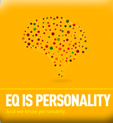 Emotional intelligence, or EQ, is the ability to identify and manage your own and others’ emotions. While this is important in any business, it is especially integral in the healthcare industry.
Emotional intelligence, or EQ, is the ability to identify and manage your own and others’ emotions. While this is important in any business, it is especially integral in the healthcare industry.
Other than better bedside manner, what does EQ have to do with medical care, you may ask? According to the Journal of the American Medical Association, 40% of patients who unexpectedly returned after an initial primary care visit had been misdiagnosed, and almost 80% of the misdiagnoses were tied to problems in doctor-patient communication.
That’s not okay.
Considering the typical doctor’s office visit involves 15 minutes or less with a physician, it isn’t surprising that communication is a problem. Unfortunately, the U.S. faces a growing shortage of primary care physicians, so 15-minute interactions are likely to remain the norm.
So, how can doctors improve patient communication within such limited interaction? By upping their EQ. A study published in Academic Medicine showed that as doctor’s attention to feelings, empathetic concern, and degree of perspective taking – all factors of EQ – increased, so did the quality of doctor-patient communication.
Needless to say, increased communication can lead to better patient outcomes as well as fewer malpractice lawsuits. A study published in the American Journal of Medicine compared physicians’ patient satisfaction survey scores with unsolicited complaints and risk management episodes. It found that, compared to doctors in the highest third of patient satisfaction, doctors in the middle third had 26% higher rates of malpractice lawsuits, and patients in the lowest third had 110% higher rates. What a difference!
Higher EQ also leads to better handoffs and transitions between shifts and departments as well as better healthcare leaders. Learn more and find out what techniques coaches can employ for more emotionally intelligent (and safer) healthcare workers.
Topics: EQ, emotional intelligence

Who wouldn’t want a higher level of emotional intelligence?
“Studies have shown that a high emotional quotient (or EQ) boosts career success, entrepreneurial potential, leadership talent, health, relationship satisfaction, humor, and happiness,” says Dr. Tomas Chamorro-Premuzic.
We sat down with the VP of Innovation and Research to pick his thoughts on emotional intelligence. Here’s what he had to say…
It’s not a secret that people with higher EQ are more rewarding to deal with. Is it possible to raise our EQ?
Your level of EQ is firm, but not rigid. Our ability to identify and manage our own and others’ emotions is fairly stable over time, influenced by our early childhood experiences and even genetics. That doesn’t mean we can’t change it, but, realistically, long-term improvements will require a great deal of dedication and guidance.
Does EQ change over time?
Fortunately, EQ tends to increase with age, even without deliberate interventions. That’s the technical way to say that (most people) mature with age. The bottom line is that some people are just naturally more grumpy, shy, self-centered or insecure, while other people are blessed with natural positivity, composure, and people-skills. However, no human behavior is unchangeable.
Do EQ coaching programs work?
Yes. Although no program can get someone from 0 to 100%, a well-designed coaching intervention can easily achieve improvements of 25%. Various meta-analyses suggest that the most coachable element of EQ is interpersonal skills — with average short-term improvements of 50%. Think of it as teaching negotiation and social etiquette — what the great Dale Carnegie called “how to win friends and influence people.”
So we can learn empathy?
Even empathy can be trained in adults. The most compelling demonstration comes from neuropsychological studies highlighting the “plasticity” of the social brain. These studies suggest that, with adequate training, people can become more pro-social, altruistic, and compassionate.
Which is easier to change – reputation or identity?
Everyone can change, but few people are seriously willing to try. Think about the worst boss you ever had — how long would it take him to start coming across as more considerate, sociable, calm or positive? And that’s the easier part — changing one’s reputation. It is even harder to change one’s internal EQ; in other words, you might still feel stressed out or angry on the inside, even if you manage not to show those emotions on the outside.
Are individuals good judges of EQ?
Most of us are generally unaware of how others see us — and this especially true for managers. A recent meta-analysis shows that the relationship between self- and other-ratings of EQ is weak (weaker, even, than for IQ). In other words, we may not have a very accurate idea of how smart we are, but our notion of how nice we are is even less accurate. Thus any intervention focused on increasing EQ must begin by helping people understand what their real strengths and weaknesses are..
Are certain people more changeable than others?
Yes, some people are more capable of changing than others. Ironically, those individuals tend to be more pessimistic about their very chances of changing. Indeed, neurotic, introverted and insecure people are more likely to change, whereas highly adjusted and resilient individuals are less changeable. Likewise, optimism breeds overconfidence and hinders change by perpetuating false hopes and unrealistic expectations. There is an old joke about how many psychologists it takes to change a light bulb. Just one — so long as the light bulb wants to change.
Besides coaching, how can we improve our EQ?
The recipe for self-change is fairly straightforward — it is just hard to implement. In order to change, we need to start by building self-awareness, which is best achieved by obtaining (and believing) honest and critical feedback from others. Next, we must come up with a realistic strategy that focuses on attainable goals, such as changing a few specific behaviors (e.g., more eye contact, less shouting, more smiling, etc.) rather than substantial aspects of our personality (e.g., interpersonal sensitivity, empathy, and sociability). Finally, we will need an enormous amount of effort and dedication in order to both attain and maintain any desired changes — or we will quickly revert to our old habits.
Topics: EQ, emotional intelligence
 As a leader in personality assessment, we've been studying this stuff for decades (really, ask us anything). We know cognitive ability is only a partial predictor of career success. In most jobs, it's EQ, the ability to identify and manage your own and others' emotions, that really matters. People skills determine success, and individuals who lack the ability to build effective relationships are destined to fail -- no matter how smart or talented they are.
As a leader in personality assessment, we've been studying this stuff for decades (really, ask us anything). We know cognitive ability is only a partial predictor of career success. In most jobs, it's EQ, the ability to identify and manage your own and others' emotions, that really matters. People skills determine success, and individuals who lack the ability to build effective relationships are destined to fail -- no matter how smart or talented they are. The Hogan EQ Report provides organizations with a scientifically validated tool to measure emotional intelligence. Based on the Hogan Personality Inventory and Hogan Development Survey, the easy-to-understand report provides an overall EQ score, as well as scores and feedback for six emotional competencies.
Check out this video for more on the Hogan EQ Report.
Topics: EQ, emotional intelligence
Can You Really Improve Your Emotional Intelligence?
Posted by Tomas Chamorro-Premuzic on Thu, May 30, 2013
 Who wouldn't want a higher level of emotional intelligence? Studies have shown that a high emotional quotient (or EQ) boosts career success, entrepreneurial potential, leadership talent, health, relationship satisfaction, humor, and happiness. It is also the best antidote to work stress and it matters in every job — because all jobs involve dealing with people, and people with higher EQ are more rewarding to deal with.
Who wouldn't want a higher level of emotional intelligence? Studies have shown that a high emotional quotient (or EQ) boosts career success, entrepreneurial potential, leadership talent, health, relationship satisfaction, humor, and happiness. It is also the best antidote to work stress and it matters in every job — because all jobs involve dealing with people, and people with higher EQ are more rewarding to deal with.
Most coaching interventions try to enhance some aspect of EQ, usually under the name of social, interpersonal, or soft skills training. The underlying reasoning is that, whereas IQ is very hard to change, EQ can increase with deliberate practice and training.
But what is the evidence? For example, if you've been told you need to keep your temper under control, show more empathy for others, or be a better listener, what are the odds you can really do it? How do you know if your efforts will pay off, and which interventions will be most effective?
Nearly 3,000 scientific articles have been published on EQ since the concept was first introduced in 1990, and there are five key points to consider.
Continue reading on the HBR Blog Network.
More on EQ
Overview
eBook | Want a Better Job?
Infographic | Who's Got the Highest EQ?
Sample Report
Video | Why EQ?
Topics: EQ, emotional intelligence

Topics: EQ, emotional intelligence
Hogan has been studying emotional intelligence and its impact on organizational effectiveness for decades. In this short video, Dr. Tomas Chamorro-Premuzic, vice president of research and innovation, explains the concept of emotional intelligence, why it’s important, how we measure it, and what it means for you.
For more information, check out our ebook, Want a Better Job? Learn to Control Your Emotions.
Topics: EQ, emotional intelligence
“Control, control, you must learn control,” Yoda said to Luke Skywalker during Jedi training. Just like Luke, employees must be aware of and learn to control their emotions if they want to be successful at their job (whether their job involves fighting intergalactic forces or receiving critical feedback on a presentation). Fortunately for Luke, he had a great coach and eventually became self-aware enough to conquer his volatile tendencies and channel his emotional energy into the task at hand.
When hiring, it is common to assess not only a candidate’s hard skills, educational background and resume points, but also to take into consideration his or her workplace demeanor. Unfortunately, brief interview sessions provide little opportunity to examine a person’s emotional output when faced with certain workplace situations.
Like Luke, many employees have greatness within them, but lack the tools to successfully put their emotions aside. Assessing emotional intelligence (EQ), the ability to identify, process, and manage one’s own and others’ emotions, provides this acumen in the form of self-awareness. The Hogan EQ assessment measures along six essential workplace emotional competencies:
Emotional Perception
- Self-awareness – the ability understand the emotions that are causing their current mood
- Detection – the ability to interpret others’ intentions, actions, and motivations
Emotional Control
- Regulation – the ability to seem calm under pressure and resilient in the face of failure
- Influence – the ability to empower and instill confidence in others.
Emotional Sharing
- Expressivity – the ability to effectively communicate a desired emotional state to others
- Empathy – the ability to more deeply engage in social interactions and collaborative experiences
By providing a measurement of emotional intelligence, Hogan’s EQ report gives employees insight into the roles their emotions play in their worklife as well as how they are perceived by others. By understanding their natural strengths and weaknesses, employees can learn to compensate for those behaviors. Interested in learning more about how we assess EQ? Download our complimentary eBook, Want a Better Job? Learn to Control Your Emotions.
Topics: EQ, emotional intelligence
 Although much of the panic surrounding their generation has subsided, the fact that many Millennials struggle to find and maintain employment has not. According to recent numbers from the U.S. Department of Labor, unemployment among Millennials (ages 18-29) was nearly double the national unemployment rate in January 2013, having risen faster than any other demographic.
Although much of the panic surrounding their generation has subsided, the fact that many Millennials struggle to find and maintain employment has not. According to recent numbers from the U.S. Department of Labor, unemployment among Millennials (ages 18-29) was nearly double the national unemployment rate in January 2013, having risen faster than any other demographic.
Some of this can be blamed on a still-recovering job market, but the persistent nature of under- and unemployment among millennials suggests that this demographic lacks some skill necessary to obtain employment.
In the 1990s, the U.S. department of labor conducted a survey examining what companies want from their employees. The report identified five critical workplace competencies:
1) Locating and allocating resources
2) Acquiring and interpreting information
3) Understanding complex systems
4) Technological literacy
5) Interpersonal skills
When it comes to the first four requirements, today’s young employees are quite advanced relative to their older peers at that age. Millennials came up in the age of the Internet search, social media and crowdsourcing, and are adept at searching for, finding, and synthesizing information. And as far as technological literacy, the Pew Research Center called them digital natives in a landscape of immigrants. However, the fifth competency, interpersonal skills, is where many young employees fall short. And that’s a big problem.
Emotional Intelligence (EQ) - the ability to identify, process, and manage one’s own and others’ emotions – is an essential part of building and maintaining positive, productive relationships, which is an essential skill in most jobs. Interested to know more about how we measure and improve individuals’ EQ? Check out our complimentary eBook here.
Topics: EQ, emotional intelligence

Introducing the Hogan EQ Report. EQ, the ability to identify and manage your own and others’ emotions, determines success in nearly every job. Those who lack the ability to build effective relationships are destined to fail – no matter how smart they are. The Hogan EQ Report provides organizations with a scientifically validated tool to measure emotional intelligence.
Want to know more? Check out our ebook, Want a Better Job? Learn to Control Your Emotions.
Topics: EQ, emotional intelligence



